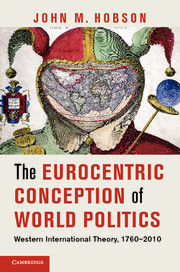The Eurocentric Conception of World Politics - Western International Theory, 1760–2010
John M. HOBSON
Availability: Out of stock - available in 10 open days
- Categories: External Relations, Governance & Politics
- Publisher: CAMBRIDGE UNIVERSITY PRESS
- ISBN: 9781107604544
- Publication Date: 01/03/2012
- Binding: Paperback
- Number of pages: 406
Summary
John Hobson claims that throughout its history most international theory has been embedded within various forms of Eurocentrism. Rather than producing value-free and universalist theories of inter-state relations, international theory instead provides provincial analyses that celebrate and defend Western civilization as the subject of, and ideal normative referent in, world politics. Hobson also provides a sympathetic critique of Edward Said's conceptions of Eurocentrism and Orientalism, revealing how Eurocentrism takes different forms, which can be imperialist or anti-imperialist, and showing how these have played out in international theory since 1760. The book thus speaks to scholars of international relations and also to all those interested in understanding Eurocentrism in the disciplines of political science/political theory, political economy/international political economy, geography, cultural and literary studies, sociology and, not least, anthropology.
• Provides a thorough history of the development of ideas in international relations over 250 years
• A provocative argument that ideas in international relations are not objective and scientific, but assume the superiority of Western civilization
• Contributes to debates about Edward Said's views on Orientalism across the humanities and social sciences
Table of contents
1. Introduction: constructing Eurocentrism and international theory as Eurocentric construct;
Part I. 1760–1914: Manifest Eurocentrism and Scientific Racism in International Theory:
2. Eurocentric imperialism: liberalism and Marxism, c.1830–1914;
3. Eurocentric anti-imperialism: liberalism, c.1760–1800;
4. Racist anti-imperialism: liberalism and cultural-realism, c.1850–1914;
5. Racist imperialism: 'racist-realism', liberalism, and socialism, c.1860–1914;
Part II. 1914–1945: Manifest/Subliminal Eurocentrism and the High Tide of Scientific Racism in International Theory:
6. Anti-imperialism and the myths of 1919: Eurocentric Marxism and racist cultural-realism, 1914–1945;
7. Racist and Eurocentric imperialism: racist-realism, racist-liberalism, and 'progressive' Eurocentric liberalism/Fabianism, 1914–1945;
Part III. 1945–1989: Subliminal Eurocentrism in International Theory:
8. Orthodox subliminal Eurocentrism: from classical realism to neorealism, 1945–1989;
9. Orthodox subliminal Eurocentrism: neo-liberal institutionalism and the English school, c.1966–1989;
10. Critical subliminal Eurocentrism: Gramscianism and world-systems theory, c.1967–1989;
Part IV. 1989–2010: Back to the Future of Manifest Eurocentrism in Mainstream International Theory:
11. Imperialist and anti-imperialist Eurocentrism: post-1989 'Western-realism' and the spiritual return to post-1889 racist-realism;
12. Imperialist Eurocentrism: post-1989 'Western-liberalism' and the return to post-1830 liberal paternalist Eurocentrism;
Part V. Conclusion: Mapping the Promiscuous Architecture of Eurocentrism in International Theory, 1760–2010:
13. Constructing civilization: global hierarchy, 'gradated sovereignty' and globalization in international theory, 1760–2010; Bibliography;
Index.
